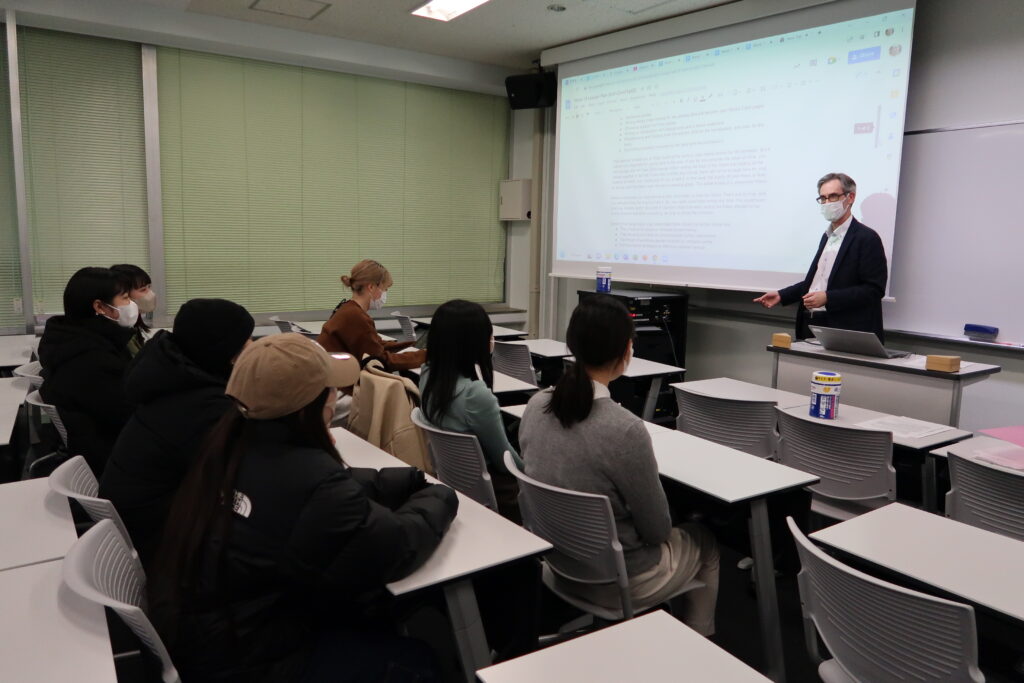今回の記事は英コミのマッカーシー先生に書いていただきました。英文の下に日本語訳があります。
Since last year, the Critical Thinking Skills course has been part of Eicomi’s second-year curriculum. But what, exactly, is “critical thinking,” and why is it important? Let’s start with a definition. According to the American philosopher and educator John Dewey (1859-1952), “The essence of critical thinking is suspended judgment; and the essence of this suspense is inquiry to determine the nature of the probem before proceeding to attempts at its solution” (How We Think, 1910). When we think critically, we don’t make quick decisions based on what we’ve done in the past, for example. We carefully consider the situation and judge what the good and bad points (pros and cons) of a particular action would be. In order to make these judgments, we need to think about what type of evidence there is to support each side and how reliable that evidence is. If you think that English skill is becoming more important in Japanese companies these days, why do you think so? Did you hear it from a friend whose sister is job hunting? Did you read it in a newspaper article that cites a survey of 1,000 Japanese company presidents? Which is stronger evidence? In this case, it’s easy to see that the newspaper article is more reliable. But sometimes it’s not so easy to see why one piece of evidence is stronger than another. For example, a newspaper may have a particular political bias and may present evidence in a biased way. In the Critical Thinking Skills course, you’ll develop your ability to find such bias in articles so that you can make your own judgments about the evidence presented. You’ll also develop your ability to support your own opinions with strong evidence, both in speaking and in writing.
The ability to clearly express and defend a position is important in many ways. In Eicomi, it will help you write effective papers, including an effective graduation thesis, and it will help you in other activities such as debates and presentations. For students planning to go on to study at one of Showa’s English Medium Instruction (EMI) partner schools, including Temple University, Japan, these skills will be particularly useful. In English-speaking countries, it is common for students to practice supporting their opinions with evidence, even in elementary school. By the time they reach university, these students are used to applying these skills in research papers. Typically, Japanese students of the same age have less practice with these skills, so building them up in the Critical Thinking Skills course is a good way to prepare for future study in an all-English environment. In addition, improving your critical thinking is good preparation for entering the workforce. In many jobs, you’ll be required to write reports and give presentations stating an opinion and defending that opinion. You may need to do this in English, but even if you don’t, having well developed critical thinking skills will be a great advantage.
Critical Thinking Skillsの科目は、昨年度から英語コミュニケーション学科2年生向けの授業として開講されました。Critical Thinkingとは一体何なのでしょう。それはなぜ重要なのでしょうか?まずは言葉の定義から始めてみましょう。
アメリカの哲学者・教育家ジョン・デューイ(John Dewey)は「批判的思考の本質は判断を一旦留保することにある。そして、この判断留保の核心は、問題解決を図ることに先立って、その問題の特性自体を捉えようと探求することにある」と“How We Think”という本の中で説明をしています。物事を考えるときに、私たちは、自身の過去の行いにもとづいて短絡的に判断を下すような真似はしません。私たちは慎重に状況を見極め、良い点や悪い点がどのようなものであるかについて判断をします。慎重な判断をするさいに、私たちは異なる立場を補強するためのどのようなタイプの証拠が存在し、どの程度それらが信用に値するのかについて考慮しなければなりません。
Critical Thinking Skillsのクラスにおいて、学生は提示された証拠について自分で判断が下せるよう、偏見・偏向を見つけ出す能力を高めていくことになります。学生はスピーキングとライティングの両方において、強力な証拠を用いながら自身の意見を補強する能力を磨いていくことになります。
立場を明確に示す能力や立場を守り抜く能力を身につけることは、多くの点において重要です。英語コミュニケーション学科において、そうした能力は卒業論文を含む論文・レポートを効果的に執筆する際に役立ちますし、ディベートやプレゼンテーションなどの活動でも学生たちを手助けしてくれます。留学をする学生にとって、これらのスキルは特に役立つはずです。
英語を話す国々の学生たちにとって、証拠を示して自分の意見を強化する訓練はありふれたものであり、小学校でも実践されています。海外の学生たちは、大学へ進学する頃までに、研究レポートの作成や提出などを通じてそうしたスキルの応用に慣れ親しむのです。通常、同年代の日本人学生はそのようなスキルの訓練が不足しています。そのためすべて英語を介して行われる環境での学習が見込まれる将来に向け、批判的思考能力のクラスで能力向上を図ることは、非常に良い方法です。Critical Thinking Skillsを磨くことは、就職のための良い準備にもなります。
多くの職場では、報告書を書いたり、意見を述べたり、プレゼンテーションを行ったりすることがよくあります。英コミ学生の場合は、英語を使用しながら行うこともあるかもしれません。Critical Thinking Skillsを有していることは、将来大きな強みになるはずです。

